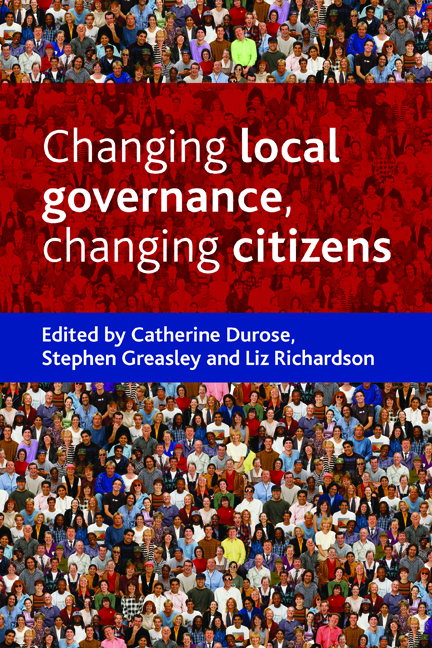Book contents
- Frontmatter
- Dedication
- Contents
- List of boxes and tables
- Acronyms
- Notes on contributors
- Acknowledgments
- Foreword
- Preface
- one Changing local governance, changing citizens: introduction
- two Citizen governance: where it came from, where it’s going
- three ‘Neighbourhood’: a site for policy action, governance … and empowerment?
- four Urban housing market restructuring and the recasting of neighbourhood governance and community
- five Citizen aspirations: women, ethnicity and housing
- six Can we promote cohesion through contact? Intergroup contact and the development of community cohesion
- seven New migrants, citizenship and local governance: ‘Poles’ apart?
- eight Citizens of faith in governance: opportunities, rationales and challenges
- nine Citizens’ reflections on behaviour change policies
- ten Every child’s voice matters?
- eleven e-citizenship: reconstructing the public online
- twelve Conclusion
- Index
two - Citizen governance: where it came from, where it’s going
Published online by Cambridge University Press: 16 July 2022
- Frontmatter
- Dedication
- Contents
- List of boxes and tables
- Acronyms
- Notes on contributors
- Acknowledgments
- Foreword
- Preface
- one Changing local governance, changing citizens: introduction
- two Citizen governance: where it came from, where it’s going
- three ‘Neighbourhood’: a site for policy action, governance … and empowerment?
- four Urban housing market restructuring and the recasting of neighbourhood governance and community
- five Citizen aspirations: women, ethnicity and housing
- six Can we promote cohesion through contact? Intergroup contact and the development of community cohesion
- seven New migrants, citizenship and local governance: ‘Poles’ apart?
- eight Citizens of faith in governance: opportunities, rationales and challenges
- nine Citizens’ reflections on behaviour change policies
- ten Every child’s voice matters?
- eleven e-citizenship: reconstructing the public online
- twelve Conclusion
- Index
Summary
Introduction
Democratic theory presents different conceptions of the role of the citizens as policy makers. At one extreme is the classical ideal of active citizens, who directly participate in public decisions in a face-to-face context alongside their peers; at the other end of the spectrum is the Schumpeterian elitist conception, whereby relatively passive individuals choose between different elites that compete for the vote, leaving experts in charge of day-to-day affairs between elections. It is probably the case that the practice of a democracy never reaches either extreme; all political systems have some direct forms of participation built into them as well as summative occasions whereby citizens elect leaders who are then left to be able to do their job. There is no pure form of democracy, but only combinations of institutions and practices that persist over time.
The differences between these forms of democratic connection are a matter for endless debate and affect the frequent projects for institutional reform. The elites of political systems tend to want to move between one and the other type of mechanism. By necessity, the busyness of modern life; the relative lack of interest in politics on the part of the average citizen; the longevity of existing representative political institutions; and the exigencies of a large country needing methods of preference aggregation almost inevitably ensure the continuing importance of representation and the passivity of the individual. More direct forms of engagement may not be viable in the modern context. On the other hand, a sense of loss for a more vibrant democratic age inspires policy makers to introduce institutions to engage people more directly in public policy decisions. Politicians are apprehensive about the decline in conventional forms of participation, such as voting and membership of political parties, and seek to revive it in other contexts. Citizens themselves have embraced more active styles of participation, questioning the decisions of bureaucracies and becoming more assertive in getting their views across. These factors point in the opposite direction, towards a rediscovery of the civic and to placing citizens at the heart of public administration. Whether what may be called citizen governance can be effective without reconstructing other aspects of the political system, in particular the current forms of bureaucratic organisations, is a question that this chapter seeks to answer.
- Type
- Chapter
- Information
- Changing Local Governance, Changing Citizens , pp. 13 - 30Publisher: Bristol University PressPrint publication year: 2009



